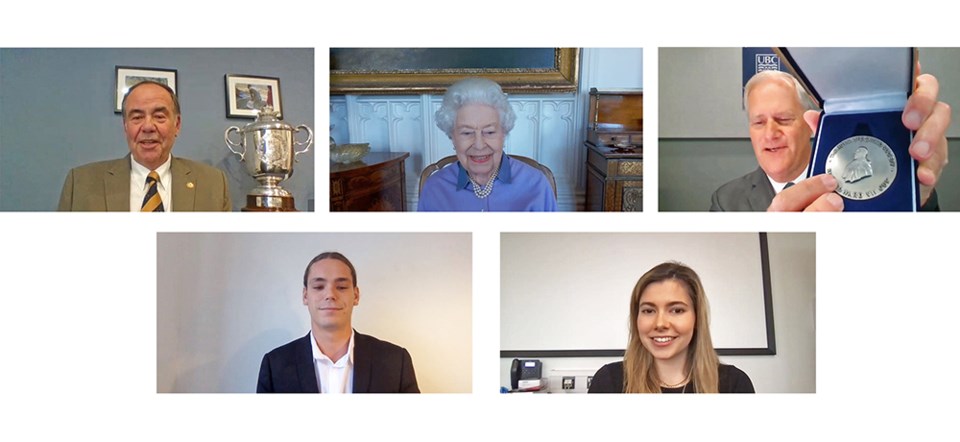Former Powell River aquatic supervisor Dr. Steve Beerman has been bestowed an enormous honour by Queen Elizabeth for his decades of contributions to drowning prevention.
Beerman has received the King Edward VII Cup, awarded by the queen every two years in recognition of outstanding contributions to drowning prevention. Drowning kills an estimated 235,000 people a year worldwide.
Beerman, in non-COVID-19 times, would have been able to go to London, England, to accept the cup from the queen. He has been in Buckingham Palace and has seen the presentation of the cup to other individuals on previous occasions. This year’s ceremony was conducted through Zoom.
“It was actually my idea to do this virtually,” said Beerman. “I received notification that I was receiving this award in February 2020 and at that time COVID-19 was restricting everybody’s ability to do nearly everything.”
Beerman said the amount of communication that takes place at an in-person event is limited, so with the online meeting, he was able to have more conversation than would have occurred at an in-person event.
“There were benefits to doing it this way,” said Beerman. “I didn’t have to travel to the UK with my family and create carbon emissions in the process. The ceremony was about 20 minutes long and the queen was very conversational.”
The queen congratulated Beerman for more than 40 years of work to draw attention to drowning as a major public health issue, from undertaking research on the ground in the hardest-hit countries, to implementing Canada’s first drowning prevention plan.
On presenting the cup to Beerman, the queen said: “I’m very delighted to be able to present you with this cup – a very large cup, which one day you might see if you come to London.”
Powell River years
Beerman, now a retired family physician in Nanaimo, moved to Powell River at the age of one, spending his formative years in Powell River, learning to swim here and becoming involved in aquatics through the Porpoise Swim Club, and through receiving swimming and lifesaving instruction through Red Cross and Royal Lifesaving Society courses.
Beerman became a lifeguard and his leadership skills became evident at a young age when he supervised the summer aquatic program in the early to mid-1970s, coming back to Powell River each summer while he was in university to work in the aquatic field. Time requirements for his studies eventually ended his tenure as the leader of Powell River aquatics.
Beerman said he had early leadership opportunities in abundance and credits that for his longevity and contributions to this field.
“I had great mentors and great people who helped me get into those positions and helped me through those positions when I was quite young,” said Beerman. “My first meeting with the queen was in 1981 when I was in my 20s. I was a university student and already attending international meetings of lifesaving.”
Beerman’s interest in drowning carried on while training to become a physician. As a result of his interest, he was invited onto the medical advisory committee of the Royal Lifesaving Society of Canada and he was able to share and learn from them. Before he finished medical school, Beerman was the chair of the committee.
He was asked if he wanted to become more significantly involved in the leadership of the society and became vice-president, and later became national president from 1991 to 1994. During that period of time the name was changed to the Lifesaving Society of Canada.
He became involved with the International Life Saving Federation as the Canadian representative and went on to be chair of the medical advisory group. He later became president of the federation in 2008 and carried on in that role until 2012.
Primary prevention
Beerman said he realized that trying to resuscitate people who had been involved in drowning was a tragic outcome nearly all of the time, especially in the lower income parts of the world, where they don’t have the medical interventions, and nearly all die.
“I became much more interested in primary prevention,” said Beerman. “How do you move from trying to resuscitate people where the outcomes are bad to actually preventing this? I became much more interested as I matured in my career that primary prevention was where the biggest impact could be.”
Beerman said there was research work being done in Asia and he became involved. A Canadian federal grant was applied for and received. Work was done in Bangladesh to demonstrate that there were some simple, inexpensive drowning prevention innovations and interventions that worked well, he said. The work in Bangladesh has been successfully expanded to other nations.
Beerman said he continues to chair the Canadian Drowning Prevention Coalition, and continues to be a trustee for the Royal Lifesaving Society Commonwealth on its board. He sits with a World Health Organization working group on drownings. He also mentors others, paying forward the mentorship he received.
“I have this amazing collaborative group of people who I’ve met in my journey throughout the world,” said Beerman. “I get to work with incredible people. I’ve had such great opportunities to further the drowning prevention field. It’s been a lot of fun and a lot of learning and hopefully, it’s been helpful.”
One of his big objectives is that every child should have water safety education, survival swim capabilities and basic CPR ability.
“We should be able to deliver that to every child on the planet,” said Beerman. “We’ve tested that in low-income countries and it’s doable. It just needs investment from government or from outside investors. There’s lots of cool work yet to be done.
“It’s really been an honour to have this journey.”
For the video presentation by Queen Elizabeth, readers can follow this link: youtube.com/watch?v=zYCYUwzwN1U.




